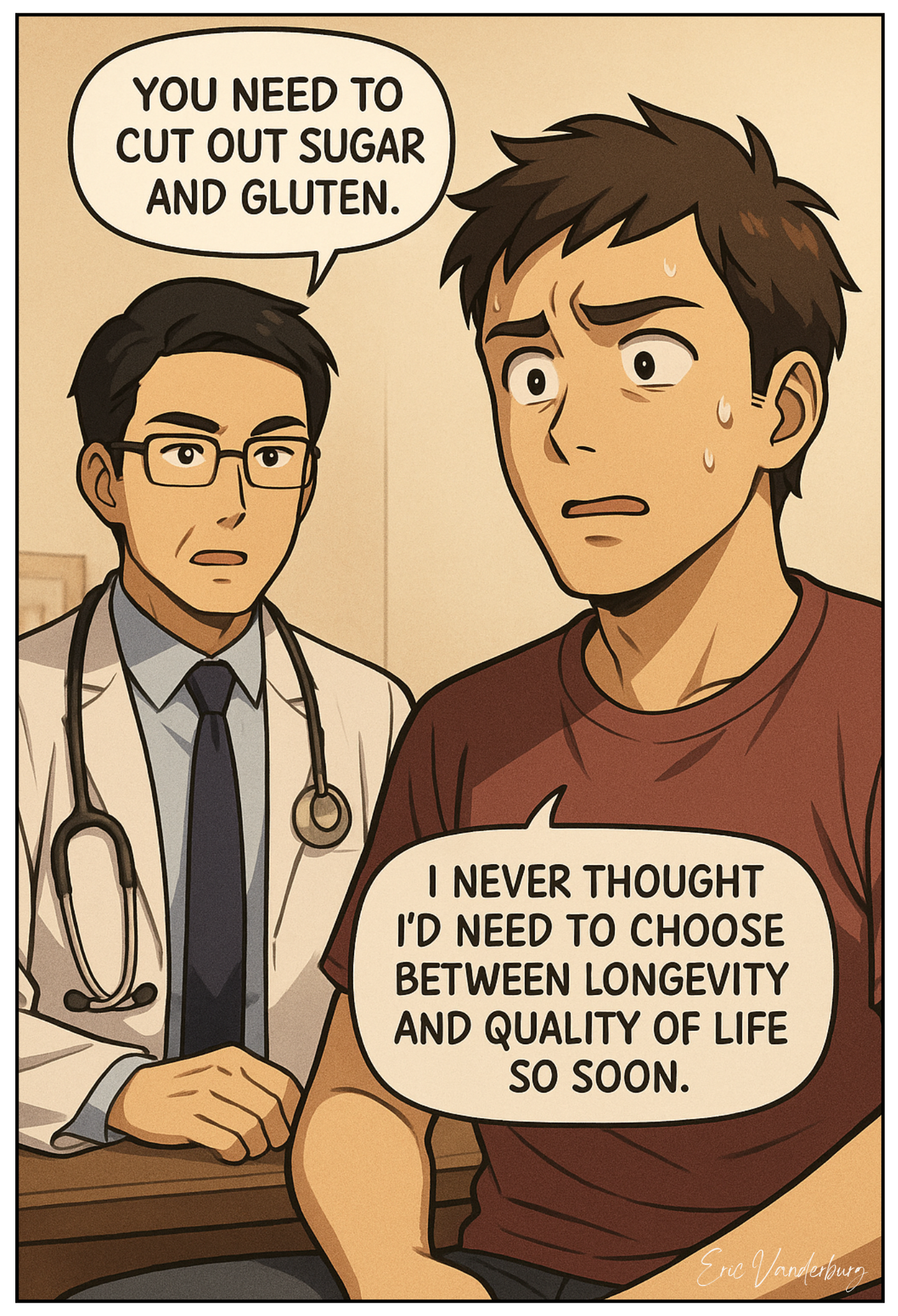Quality of Life
There comes a deeply human moment in an oncologist’s office when statistics and survival curves fall away, and a person faces the most personal of choices. It’s the point where hope meets honesty, where we weigh more time against the toll of treatment: fatigue, nausea, the quiet erosion of memory, appetite, and self. To forgo that path is not surrender; it is an act of profound clarity. It’s the recognition that a single, vivid day of being oneself may be worth more than a month spent simply existing. It is a sacred, painful decision of life versus living.
The rest of us, meanwhile, are having a diluted version of that same conversation every time we go for a checkup or read the latest “breakthrough” in nutrition science. We too are asked to make a kind of treatment decision—just without the dramatic lighting or solemn music.
This is the modern wellness dilemma: are we willing to trade the crispy, the creamy, the perfectly salted, and the decadently sweet for the promise of more years; years that might be spent dutifully eating soy-based chicken and counting steps?
We’ve replaced the dramatic, end-of-life decision with a thousand quiet refusals. It’s not one big “no” to treatment; it’s a lifetime of small no’s. No to the office birthday cake, no to the late-night nachos, no to the second glass of wine. Each no is a wager on a future we can’t see, which has become a harder decision today than it was in generations past.
Something has shifted in our cultural air. We are living in the age of the instant: instant information, instant delivery, instant gratification. Waiting has become a lost art. We scroll past the “long-term benefits” section and look for the “add to cart” button. The virtue of delayed gratification, once a sign of maturity, now feels antiquated and out of style.
So, when we’re told to trade today’s pleasure for tomorrow’s health, it’s a harder sell. We’ve lost faith in patience. We want the benefits of meditation without sitting still, the effects of sleep without resting, and the wisdom of aging without getting old. We chase peace through productivity and call it balance. The discipline required to say no to current pleasures feels almost heroic. It’s no wonder the spinach feels heavier than the ice cream.
Our world moves so fast, we no longer need oncologists to tell us we’re mortal; our health apps do it daily, in pastel graphs and polite reminders. Every notification is a miniature prognosis: Stand up. Breathe. Move. Drink water. Stop existing like a human and start existing like an optimized algorithm.
Modern life has turned wellness into a full-time job. We are told that happiness can be engineered, if we only eat better, sleep deeper, and track harder. But like all demanding jobs, burnout is inevitable. There’s only so much spinach a soul can endure.
It’s no surprise, then, that the promise of longevity feels both alluring and exhausting. The ancient virtue of delayed gratification has been replaced by same-day shipping for our happiness. We live in an age where a smoothie is expected to fix our trauma and a smartwatch to compensate for our ADHD.
We teeter between indulgence and discipline. One day, we’re juicing veggies and preaching self-care; the next, we’re eating donuts in the car while asking our AI about “symptoms of stress.” Both feel right. Both feel wrong.
But maybe balance isn’t a tightrope; it’s a swing. It’s meant to move back and forth. Some days we reach for the spinach, and others, the cinnamon roll. Both, done consciously, are acts of living.
In the end, the goal isn’t to outlive our appetites but to align them; to savor joy and health in the same breath. To walk far enough to earn a soft drink once in a while. To rest deeply enough to wake without resentment. To make peace with the beautiful, ridiculous contradiction of being human.

Discussion ¬